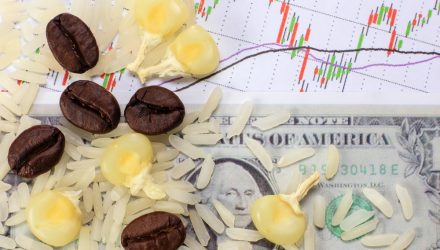Soft commodities or grains-related exchange traded funds have outperformed the equities market, providing investors with an alternative asset class to better diversify a well-rounded investment portfolio.
Over the past week, the Teucrium Wheat Fund (NYSEArca: WEAT) increased 9.9%, iPath Series B Bloomberg Softs Subindex Total Return ETN (NYSEArca: JJS) gained 5.6% and Invesco DB Agriculture ETF (DBA), rose 5.1%. The agriculture space has also given up less than the broader equity market, with WEAT only down 2.9% year-to-date.
Sal Gilbertie, President, Chief Executive Officer, Chief Investment Officer and Founder, Teucrium, believed that grains were a particularly bright spot in the investment world, highlighting a number of factors including China, supply-side hurdles and the basic demand for food regardless of the global environment.
“Year-to-date and last week through today grains are significantly outperforming equities because they march to their own fundamentals regardless of outside news,” Gilbertie told ETF Trends.
Specifically, after a year of trade wars that dominated headlines, China returned to the U.S. markets last week as the large consumer bought soybeans, wheat, and corn. This particular piece of news was overshadowed by the ongoing coronavirus or COVID-19 fear-mongering, but the return of China to U.S. markets is very significant, Gilbertie pointed out
On a more anecdotal tidbit, Gilbertie mentioned how they ordered a Lenovo computer in mid-January that was being assembled in China but were told there was a coronavirus related delay and would not be charged until the computer was assembled and ready to ship. The credit card was recently charged, which suggested that China going back to business as usual, buying grains and assembling computers.
Meanwhile, major exporters around the world are facing supply concerns due to weather and hoarding in their own countries. For instance, Russia has suspended cereal exports due to domestic supply shortages related to hoarding. Many are now looking at the U.S. with its vast agricultural supplies as the exporter of choice, with wheat markets, in particular, enjoying the most of the sudden demand.
Gilbertie also highlighted the ongoing risk of locusts that are popping up across Africa and the Middle East, and the swarm is not going away as it eats away at many crops.
Even if economic conditions get worse, people still need to eat. Demand for grains and food is not dependent on Washington’s actions, so grain investors do not appear to be concerned about fiscal stimulus because people still need to eat.
“Food use is constant regardless of economic conditions – people and animals need to eat no matter what. Demand for grains is constant and apparently, according to grocery executives, people are eating every week like it’s a holiday while they are trapped at home with their families,” Gilbertie said.
For more information on the commodities market, visit our commodity ETFs category.








